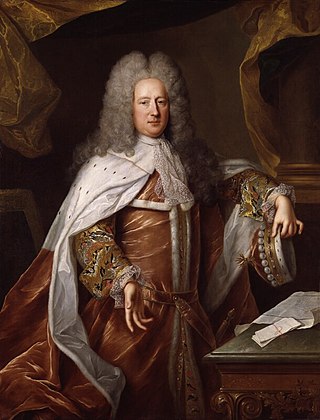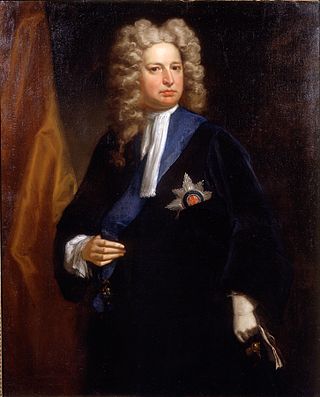
Jonathan Swift was an Anglo-Irish satirist, author, essayist, political pamphleteer, poet, and Anglican cleric who became Dean of St Patrick's Cathedral, Dublin, hence his common sobriquet, "Dean Swift".

A letter bomb is an explosive device sent via the postal service, and designed with the intention to injure or kill the recipient when opened. They have been used in terrorist attacks such as those of the Unabomber. Some countries have agencies whose duties include the interdiction of letter bombs and the investigation of letter bombings. The letter bomb may have been in use for nearly as long as the common postal service has been in existence, as far back as 1764.

Robert Walpole, 1st Earl of Orford,, known between 1725 and 1742 as Sir Robert Walpole, was a British Whig politician who served as Prime Minister of Great Britain from 1721 to 1742. He also served as First Lord of the Treasury, Chancellor of the Exchequer, and Leader of the House of Commons, and is generally regarded as the de facto first prime minister of Great Britain.

Henry St John, 1st Viscount Bolingbroke was an English politician, government official and political philosopher. He was a leader of the Tories, and supported the Church of England politically despite his antireligious views and opposition to theology. He supported the Jacobite rebellion of 1715 which sought to overthrow the new king George I. Escaping to France he became foreign minister for James Francis Edward Stuart. He was attainted for treason, but reversed course and was allowed to return to England in 1723. According to Ruth Mack, "Bolingbroke is best known for his party politics, including the ideological history he disseminated in The Craftsman (1726–1735) by adopting the formerly Whig theory of the Ancient Constitution and giving it new life as an anti-Walpole Tory principle."
This article contains information about the literary events and publications of 1712.

The System of the World is a novel by Neal Stephenson and the third and final volume in The Baroque Cycle. The title alludes to the third volume of Isaac Newton's Philosophiae Naturalis Principia Mathematica, which bears the same name.

Robert Harley, 1st Earl of Oxford and Earl Mortimer, KG PC FRS was an English statesman and peer of the late Stuart and early Georgian periods. He began his career as a Whig, before defecting to a new Tory ministry. He was raised to the peerage of Great Britain as an earl in 1711. Between 1711 and 1714 he served as Lord High Treasurer, effectively Queen Anne's chief minister. He has been called a prime minister, although it is generally accepted that the de facto first minister to be a prime minister was Robert Walpole in 1721.

General Richard Savage, 4th Earl Rivers PC was an English nobleman and soldier who was a senior Army officer in the English and then British Army. The second son of Thomas Savage, 3rd Earl Rivers and his first wife Elizabeth Scrope, Savage was styled Viscount Colchester after the death of his elder brother Thomas in 1680, he was designated by that title until he succeeded to the peerage upon the death of his father, the 3rd Earl, in 1694. Savage served as Master-General of the Ordnance and Constable of the Tower, and was briefly commander-in-chief of the forces in lieu of James Butler, 2nd Duke of Ormonde until his death in 1712.

Abigail Masham, Baroness Masham, was an English courtier. She was a favourite of Queen Anne, and a cousin of Sarah, Duchess of Marlborough.
Events from the year 1715 in Great Britain.
Events from the year 1712 in Great Britain.
Brigadier-General Samuel Masham, 1st Baron Masham, was a British courtier in the court of Queen Anne, and the husband of her favourite, Abigail, Lady Masham.
Major-General John "Jack" Hill was a British army officer and courtier during the reign of Queen Anne. While of no particular military ability, his family connections brought him promotion and office until the end of Anne's reign.
A bandbox is a type of box, or a small baseball park. Bandbox, band box or band-box may also refer to:

George Henry Hay, 8th Earl of KinnoullFRS, styled as Viscount Dupplin from 1709 to 1719, was a British peer, Tory politician, and diplomat.

The Harleyministry was the British government that existed between 1710 and 1714 in the reign of Queen Anne. It was headed by Robert Harley and composed largely of Tories. Harley was a former Whig who had changed sides, bringing down the seemingly powerful Whig Junto and their moderate Tory ally Lord Godolphin. It came during the Rage of Party when divisions between the two factions were at their height, and a "paper war" broke out between their supporters. Amongst those writers supportive of Harley's government were Jonathan Swift, Daniel Defoe, Delarivier Manley, John Arbuthnot and Alexander Pope who clashed with members of the rival Kit-Kat Club.
During the early 18th century, Great Britain was undergoing a government shift into a two party system. The leading conservative political grouping, the Tories, was the primary political party, but at the turn of the 18th century the Whigs, a liberal faction, had begun to rise in influence. As the parties struggled for power in Parliament, tensions rose. When the Whig Party continued to grow in power and influence, gaining more representation in Parliament and recognition in the general public, the Tories found themselves challenged over their policies and opinions. The arguments of government went beyond the House of Parliament. Public speeches, debates, and other forms of popular influence arose, creating a new style of politics. This was the environment that Princess Anne found herself when she became Queen of England, Scotland and Ireland on 8 March 1702. Her brother-in-law, William III of England and II of Scotland, who had preceded her, had been in support of the growing two party system, and in respect, Anne "endured" the Whigs despite her personal preference for the Tory party. The tensions between the parties had escalated to the point where party members became paranoid of conspiracies and conducted plots against one another. The Whigs concocted assassination plots against important Tory figures as an attempt to make way for their policies and political agendas.
John Macky was a Scottish spy and travel writer. Between 1688 and 1710 he ran a successful intelligence gathering network across the English Channel, principally concerned with Jacobite and French threats to England. He was also the author of several publications which reflected his travel, political outlook and access to leading figures of the period.

The Peerage Bill was a 1719 measure proposed by the British Whig government led by James Stanhope, 1st Earl Stanhope, and Charles Spencer, 3rd Earl of Sunderland, which would have largely halted the creation of new peerages, limiting membership of the House of Lords.

The Impeachment of Robert Harley, Earl of Oxford was a legal process in the Kingdom of Great Britain in 1715 when the former First Minister Robert Harley, Earl of Oxford was impeached and sent to the Tower of London. Harley was accused of a number of crimes including high treason during his time in office, with charges particularly focusing on his role in the 1713 Peace of Utrecht which ended the War of the Spanish Succession.










